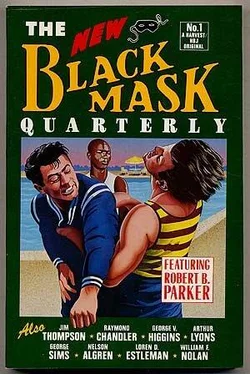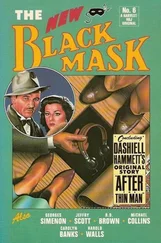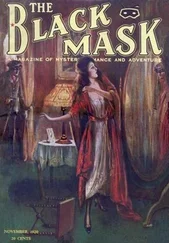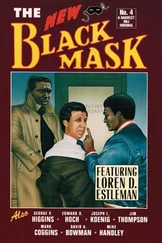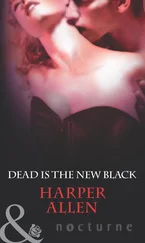Nelson Algren - The New Black Mask Quarterly (№ 1)
Здесь есть возможность читать онлайн «Nelson Algren - The New Black Mask Quarterly (№ 1)» весь текст электронной книги совершенно бесплатно (целиком полную версию без сокращений). В некоторых случаях можно слушать аудио, скачать через торрент в формате fb2 и присутствует краткое содержание. Город: Orlando, Год выпуска: 1985, ISBN: 1985, Издательство: A Harvest/HJB book Harcourt Brace Jovanovich, Жанр: Детектив, на английском языке. Описание произведения, (предисловие) а так же отзывы посетителей доступны на портале библиотеки ЛибКат.
- Название:The New Black Mask Quarterly (№ 1)
- Автор:
- Издательство:A Harvest/HJB book Harcourt Brace Jovanovich
- Жанр:
- Год:1985
- Город:Orlando
- ISBN:978-015665479-1
- Рейтинг книги:3 / 5. Голосов: 1
-
Избранное:Добавить в избранное
- Отзывы:
-
Ваша оценка:
- 60
- 1
- 2
- 3
- 4
- 5
The New Black Mask Quarterly (№ 1): краткое содержание, описание и аннотация
Предлагаем к чтению аннотацию, описание, краткое содержание или предисловие (зависит от того, что написал сам автор книги «The New Black Mask Quarterly (№ 1)»). Если вы не нашли необходимую информацию о книге — напишите в комментариях, мы постараемся отыскать её.
The New Black Mask Quarterly (№ 1) — читать онлайн бесплатно полную книгу (весь текст) целиком
Ниже представлен текст книги, разбитый по страницам. Система сохранения места последней прочитанной страницы, позволяет с удобством читать онлайн бесплатно книгу «The New Black Mask Quarterly (№ 1)», без необходимости каждый раз заново искать на чём Вы остановились. Поставьте закладку, и сможете в любой момент перейти на страницу, на которой закончили чтение.
Интервал:
Закладка:
I caught a LIAT puddle-jumper back to Antigua and checked into a quaint, two-hundred-year-old hotel in Nelson’s dockyard on the isolated side of the island and spent the next four days soaking up some serious sun and a lot of rum punches and listening to the gentle lilt of steel bands. If there was trouble in paradise, it wasn’t going to find me.
Loren D. Estleman
Bloody July
“This one is special to me,” Loren D. Estleman writes about “Bloody July.” “I have long wanted to incorporate elements of Detroit’s Prohibition past into a contemporary story, and while it is a past the present city administration would rather pretend never happened, I contend that it is Detroit’s violent history that has created its unique modern character. In addition, the personal element in this one parallels an incident in the history of my own family, which for the sake of delicacy and domestic tranquility I would rather not detail.”
Estleman is a thirty-two-year-old newspaper reporter turned novelist. He lives in Whitmore Lake, Michigan, forty miles from Detroit where his detective Amos Walker works. The most recent of the Amos Walker novels is Sugartown (1984).
The house was a half-timbered Tudor job on Kendall, standing on four acres fenced in by a five-foot ornamental stone wall. It wasn’t the only one in the area and looked as much like metropolitan Detroit as it tried to look like Elizabethan England. A bank of lilacs had been allowed to grow over the wall inside, obstructing the view of the house from the street, but from there inward the lawn was bare of foliage after the fashion of feudal estates to deny cover to intruders.
I wasn’t one. As instructed previously, I stopped in front of the iron gate and got out to open it and was on my way back to the car when something black hurtled at me snarling out of the shrubbery. I clambered inside and shut the door and rolled up the window just as the thing leaped, scrabbling its claws on the roof and clouding the glass with its moist breath.
“Hector!”
At the sound of the harsh voice, the beast dropped to all fours and went on clearing its throat and glaring yellow at me through the window while a small man with a white goatee walked out through the gate and snapped a leash onto its collar. He wore a gray sport coat and no tie.
“It’s all right, Walker,” he said. “Hector behaves himself while I’m around. You are Amos Walker?”
I cranked the window down far enough to tell him I was, keeping my hand on the handle and my eye on the dog. “You’re Mr. Blum?”
“Yeah. Drive on up to the house. I’ll meet you there.”
The driveway looped past an attached garage and a small front porch with carriage lamps mounted next to the door. I parked in front of the porch and leaned on the fender smoking a cigarette while Leonard Blum led the dog around back and then came through the house and opened the door for me. The wave of conditioned air hit me like a spray of cold water. It was the last day of June and the second of the first big heat wave of summer.
“You like dogs, Walker?”
“The little moppy noisy kind and the big gentle ones that lick your face.”
“I like Dobermans. You can count on them to turn on you someday. With friends you never know.” He ushered me into a dim living room crowded with heavy furniture and hung with paintings of square-riggers under full sail and bearded mariners in slick Sou’westers shouting into the bow wash. A varnished oak ship’s wheel as big around as a hula hoop was mounted over the fireplace.
“Nautical, I know,” said Blum. “I was in shipping a long time back. Never got my feet wet but I liked to pretend I was John Paul Jones. That wheel belonged to the Henry Morgan , fastest craft ever to sail the river. In my day, anyway.”
“That doesn’t sound like the name of an ore carrier.”
“It wasn’t”
I waited, but he didn’t embroider. He was crowding eighty if it wasn’t stuck to his heels already, with heavy black-rimmed glasses and a few white hairs combed diagonally across his scalp and white teeth that flashed too much in his beard to be his. There was a space there when we both seemed to realize we were being measured, and then he said:
“My lawyer gave me your name. Simon Weintraub. You flushed out an eyewitness to an accident last year that saved his client a bundle.”
“I’m pretty good.” I waited some more.
“How are you at tracing stolen property?”
“Depends on the property.”
He produced a key from a steel case on his belt, hobbled over to a bare corner of the room, and inserted the key in a slot I hadn’t noticed. The wood paneling opened in two sections, exposing a recessed rectangle tall enough for a man to stand in, lined in burgundy plush.
“Notice anything?” he asked.
“Looks like a hairdresser’s casket.”
“It’s a gun cabinet. An empty gun cabinet. Three days ago there wasn’t enough room to store another piece in it.”
“Were you at home when it got empty?”
“My wife and I spent the weekend on Mackinac Island. I’ve got a place there. Whoever did it, it wasn’t his first job. He cut the alarm wires and picked the locks to the front door and the cabinet slick as spit.”
“What about Hector?”
“I put him in a kennel for the weekend.”
“Are you sure someone didn’t just have a key?”
“The only key to this cabinet is on my belt. It’s never out of my sight.”
“Who else lives here besides your wife?”
“No one. We don’t have servants. Elizabeth’s at her CPR class now. I’ve got a heart I wouldn’t wish on an Arab,” he added.
“What’d the police say?”
“I didn’t call them.”
I was starting to get the idea. “Have you got a list of the stolen guns?”
He drew two sheets folded lengthwise out of his inside breast pocket, holding them back when I reached for them. “When does client privilege start?”
“When I pick up the telephone and say hello.”
He gave me the list. It was neatly typewritten, the firearms identified by make, caliber, patent dates, and serial number. Some handguns, four high-powered rifles, a few antiques, two shotguns. And a Thompson submachine gun. I asked him if he was a dealer.
“No, I’m in construction.”
“Non-dealers are prohibited from owning automatic weapons,” I said. “I guess you know that.”
“I’d have gone to the cops if I’d wanted a lecture.”
“Or a warrant for your arrest. Are any of these guns registered, Mr. Blum?”
“That’s not a question you get to ask,” he said.
I handed back the list. “So long, Mr. Blum. I’ve got some business up in Iroquois Heights, so I won’t charge you for the visit.”
“Wait, Walker.”
I had my back to him when he said it. It was the way he said it that made me turn around. It didn’t sound like the Leonard Blum I’d been talking to.
“Nothing in the collection is registered,” he said. “The rifles and shotguns don’t have to be, of course, and I just never got around to doing the paper on the handguns and the Thompson. I’ve never been fingerprinted.”
“It’s an experience no one should miss,” I said.
“I’ll take your word for it. Anyway, that’s why I didn’t holler cop. For a long time now I’ve lived for that collection. My wife lays down for anything with a zipper; she’s almost fifty years younger than me and it’s no more than I have any right to expect. But pleasant memories are tied up with some of those pieces. I’ve seen what happens to old friends when they lose all interest, Walker. They wind up in wheelchairs stinking of urine and calling their daughters Charlie. I’d splatter my brains before I’d let that happen to me. Only now I don’t have anything to do it with.”
Читать дальшеИнтервал:
Закладка:
Похожие книги на «The New Black Mask Quarterly (№ 1)»
Представляем Вашему вниманию похожие книги на «The New Black Mask Quarterly (№ 1)» списком для выбора. Мы отобрали схожую по названию и смыслу литературу в надежде предоставить читателям больше вариантов отыскать новые, интересные, ещё непрочитанные произведения.
Обсуждение, отзывы о книге «The New Black Mask Quarterly (№ 1)» и просто собственные мнения читателей. Оставьте ваши комментарии, напишите, что Вы думаете о произведении, его смысле или главных героях. Укажите что конкретно понравилось, а что нет, и почему Вы так считаете.
